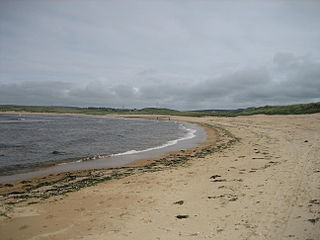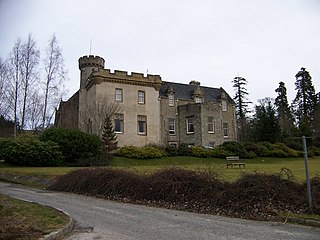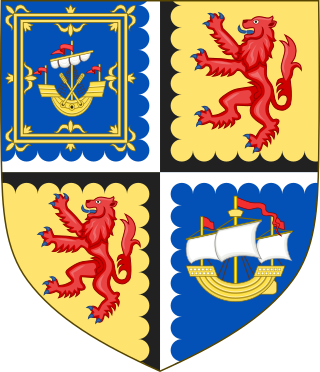
Clan Mackay is an ancient and once-powerful Highland Scottish clan from the far North of the Scottish Highlands, but with roots in the old Kingdom of Moray.

The Battle of Drumnacoub was a Scottish clan battle involving factions of the Clan Mackay fought in the far northwest of Scotland, some time between 1429 and 1433. It took place on a hill called Carn Fada at the southern end of the Kyle of Tongue, between Ben Loyal and the village of Tongue. It was fought between members of the Clan Mackay and men of the Clan Sutherland. The battle was recorded by the 15th century chronicler, Walter Bower, in his work Scotichronicon.

The Sandside Chase was a Scottish clan battle which took place in 1437 in Caithness, about 6 miles (9.7 km) west of Thurso. The Clan Mackay launched a raid from Strathnaver towards Thurso until they encountered resistance from the locals at Dounreay. The Mackays then pulled back to Sandside, where they were joined by reinforcements and slaughtered the defenders on the coast north of Reay.
The Battle of Torran Dubh also known as the Battle of Torran-dow or the Battle of Torran Du was a Scottish clan battle that was fought in 1517 in Sutherland, in the Scottish Highlands.

The Battle of Alltan-Beath, also known as the Battle of Ailtan-Beath, was a Scottish clan battle said to have taken place in 1542 in the village of Knockarthur, in Sutherland, in the Scottish Highlands. It was fought between men of the Clan Mackay and men of the Clan Sutherland whose chiefs were the Gordon, Earls of Sutherland.

The Mackays of Aberach also known as the Clan Aberach are a Scottish family and a branch of the ancient Clan Mackay of the Scottish Highlands. They were the senior cadet branch of the Clan Mackay and were seated at Achness, in Strathnaver, which is in modern-day Sutherland. In Scottish Gaelic they are known as the Sleaght-ean Aberigh.

The Bain, Bane or Bayne family of Tulloch were a minor Scottish noble family.
Huistean Du Mackay, 13th of Strathnaver, was the thirteenth chief of Clan Mackay, a Highland Scottish clan.
Angus Du Mackay, 7th of Strathnaver was the seventh chief of the Clan Mackay, a Highland Scottish clan. He is recorded in the 15th-century Scottish chronicle, Scotichronicon, as Enneas-en-Imprissi meaning Angus the Absolute due to his power of commanding 4000 men.

The Mackays of Scoury were a minor noble Scottish family and a branch of the ancient Clan Mackay, a Highland Scottish clan. They were seated at Scourie Castle, in Scourie, in the parish of Eddrachillis, county of Sutherland. However, Scourie was part of the Mackay chief's province of "Strathnaver" until it was sold to the Earl of Sutherland in 1829.
The Mackays of Borley were a minor noble Scottish family and a branch of the ancient Clan Mackay, a Highland Scottish clan. Their territorial designation of Borley is a small village within the parish of Durness, in the modern-day county of Sutherland, Scotland
Donald Mackay, 5th of Strathnaver, was the fifth chief of the ancient Clan Mackay, a Scottish clan of the Scottish Highlands.
Angus Roy Mackay, 9th of Strathnaver, was the ninth chief of the ancient Clan Mackay, a Scottish clan of the Scottish Highlands.
Iye Roy Mackay, 10th of Strathnaver, was the tenth chief of the ancient Clan Mackay, a Scottish clan of the Scottish Highlands.
Donald Mackay, 11th of Strathnaver, was the eleventh chief of the ancient Clan Mackay, a Scottish clan of the Scottish Highlands.

The Stand-off at Bengrime took place in 1601 and was a stand-off between the armies of John Gordon, 13th Earl of Sutherland and George Sinclair, 5th Earl of Caithness. Bengrime is in the county of Sutherland, Scotland.
George Mackay, 3rd Lord Reay (1678–1748), was a Scottish noble and chief of the Clan Mackay, a Scottish clan of the Scottish Highlands. During his life the Glorious Revolution took place which directly affected his family and estate, and during his chiefdom he served the British-Hanoverian Government during the Jacobite rising of 1715 and the Jacobite rising of 1745.

George Sinclair was a Scottish nobleman, the 4th Earl of Caithness and chief of the Clan Sinclair, a Scottish clan of the Scottish Highlands.
Lachlan Mor Mackintosh, 16th of Mackintosh was the chief of the Clan Mackintosh, a Scottish clan of the Scottish Highlands. He was also chief of the confederation of clans that was known as the Clan Chattan.

The Mackenzies of Gairloch were a minor noble Scottish family and one of the senior cadet branches of the Clan Mackenzie, a Scottish clan of the Scottish Highlands.










